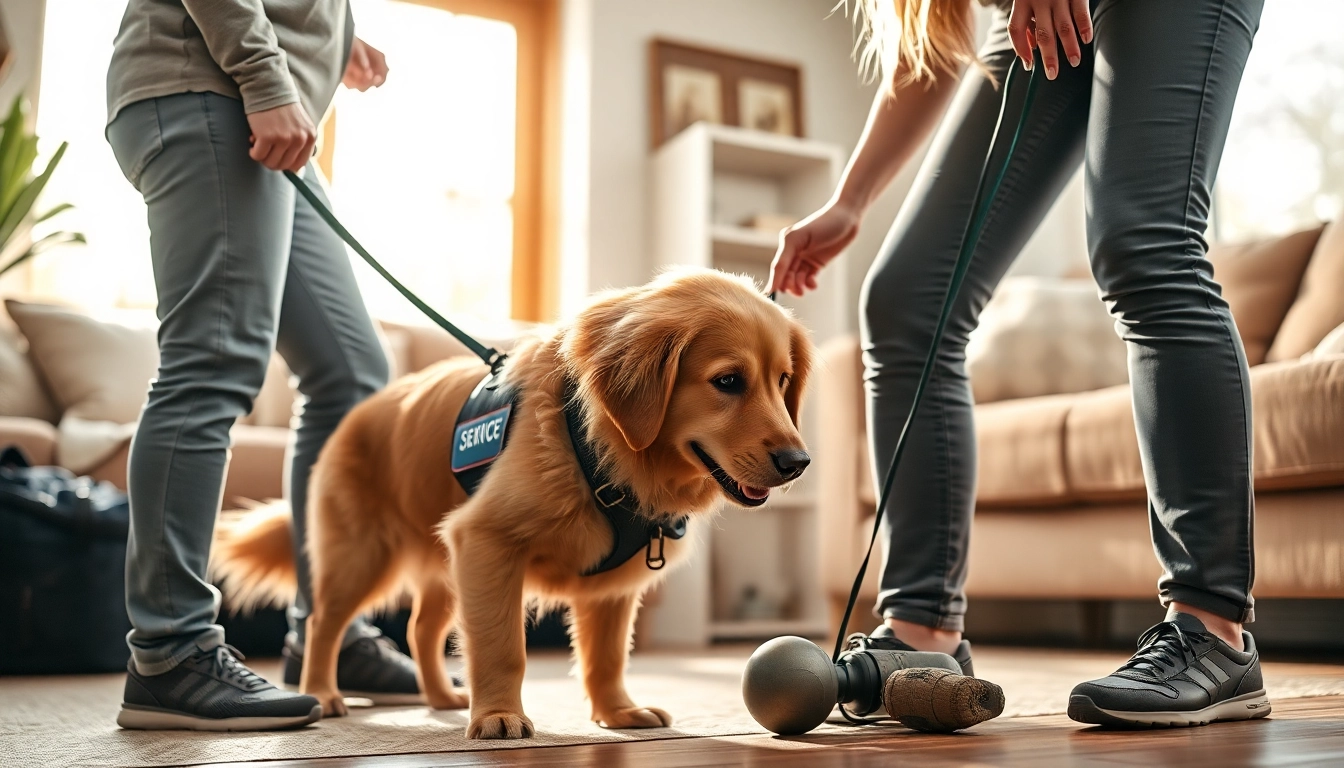Understanding PTSD and the Role of Service Dogs
What is PTSD?
Post-Traumatic Stress Disorder (PTSD) is a mental health condition that can develop after a person experiences or witnesses a traumatic event. This condition is often characterized by disturbing thoughts, feelings, or dreams related to the traumatic event. Symptoms can vary and may include flashbacks, nightmares, severe anxiety, and uncontrollable thoughts about the event. PTSD can significantly impact an individual’s daily life, affecting their ability to function and engage in social activities.
How PTSD Service Dogs Assist
PTSD service dogs are trained to aid individuals coping with the psychological symptoms of PTSD. These dogs provide emotional support, aid in the development of coping mechanisms, and can even prevent panic attacks. They are trained to recognize their owner’s triggers and respond appropriately. For example, a service dog might help create a safe space by blocking access to strangers during a moment of anxiety or reminding their owner to take medication.
Benefits of Having a Service Dog for PTSD
The benefits of having a PTSD service dog extend far beyond companionship. They can:
- Reduce Anxiety: The presence of a service dog can help lower anxiety levels significantly, providing immediate comfort during stressful situations.
- Improve Social Interaction: Service dogs can act as social catalysts, encouraging owners to engage with others and diminish feelings of isolation.
- Encourage Routine: Caring for a dog instills a sense of responsibility and routine, which can be crucial for someone struggling with PTSD.
- Assist in Daily Tasks: Service dogs can perform specific tasks that assist their owners, such as providing deep pressure therapy to calm their owner during a panic attack.
Finding a PTSD Service Dog for Sale
Researching Reputable Sources
When looking for a PTSD service dog for sale, it is essential to research reputable organizations. Start by looking for organizations that are accredited by recognized bodies in the service dog community. This accreditation ensures that the dogs are trained to meet specific standards and that the organization’s practices align with ethical training methods.
Assessing Dog Training and Qualifications
Not all service dogs are created equal. When considering a PTSD service dog, inquire about its training history. An effective service dog should have completed extensive training programs tailored to receive necessary training for PTSD. Look for training paperwork that shows the dog has mastered specific tasks, including alerting to anxiety triggers or creating space in crowded situations.
Considering Your Personal Needs
Every individual’s experience with PTSD is unique, and thus, identifying personal needs is crucial before acquiring a service dog. Consider factors such as the size of the dog, breed suitability, and specific tasks the dog must perform. Additionally, ensure you are prepared for the responsibilities that accompany service dog ownership, including daily care, training activities, and regular socialization opportunities.
Evaluating Service Dogs for PTSD
Dog Temperament and Behavior
The temperament of a service dog greatly influences its effectiveness as a companion. Look for qualities such as calmness, attentiveness, and a gentle disposition. The dog should be sociable and able to bear various stimuli since it will be accompanying you in diverse environments. Observing the dog in different settings can provide insights into its adaptability and behavior.
Health Checks and Certifications
Before acquiring a PTSD service dog, ensure it has undergone thorough health checks. Documentation should confirm that the dog is up-to-date with vaccinations and free from any underlying health issues. Certification from a vet regarding its health status and suitability for service work is also beneficial.
Compatibility with Owner
The bond between the service dog and its owner is profound; therefore, compatibility is key. Spend time with the dog to evaluate whether it matches your energy levels, personality, and specific needs. An effective partnership can significantly enhance the benefits that a service dog provides.
Caring for Your PTSD Service Dog
Daily Routine and Responsibilities
Establishing a daily routine is essential for both you and your service dog. This routine should include regular meals, exercise, and dedicated training sessions. Additionally, social outings are vital to acclimatize your dog to varied environments and distractions they may encounter.
Training and Socialization Needs
Even if your service dog is already trained, ongoing training and socialization are essential to maintain its skills and adaptability. Regular practice with commands and exposure to new situations will help reinforce its training while enabling you to strengthen your bond through shared activities.
Maintaining Health and Wellness
Health and wellness are critical components in the life of your service dog. Regular veterinary checkups, a balanced diet, and consistent exercise contribute to a dog’s longevity and effectiveness as a service animal. Pay attention to your dog’s behavior for any signs of stress or health issues, allowing for timely interventions.
Financial Considerations and Resources
Cost of PTSD Service Dogs for Sale
The cost associated with purchasing and training a PTSD service dog can vary widely, often ranging from several thousand dollars to significantly more, depending on the organization and the dog’s training level. It is essential to factor in the ongoing costs of care, including food, veterinary care, grooming, and training supplies.
Funding and Assistance Options
Fortunately, various funding options and assistance programs are available for those seeking financial help to acquire a service dog. Many non-profit organizations have funds set aside to assist individuals with the costs of training and maintaining service dogs. Research local programs or contact service dog organizations to learn about potential financial assistance that may be available to you.
Insurance and Financial Aid Resources
Insurance coverage for service dogs varies by provider and policy. Some comprehensive insurance plans may provide benefits related to veterinary care and dog training. Inquire with your insurance company to understand what they cover regarding service animal care. Additionally, local and national financial aid resources are often available to aid in the maintenance and care of service dogs, providing an essential safety net for individuals in need.














Leave a Reply